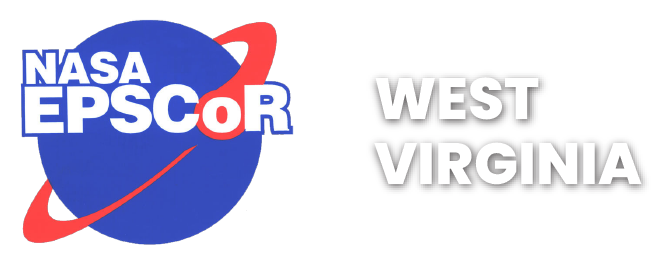About Us
Serving the state of West Virginia
West Virginia is one of the nation’s most rural states with over half of their population living in rural areas. It is very sparsely populated, with 1.85 million citizens in just over 24,000 square miles. The NASA WV EPSCoR has tailored its programs to the unique configuration of the state’s needs and strengths and limitations of various colleges and universities in the state in a way that seems to make the best use of the opportunity represented by NASA’s vision in establishing the NASA EPSCoR program. Our mosaic of programs covers all aspects of Science, Technology, Engineering, and Mathematics (STEM) education pipeline and research in West Virginia. Our partners in academia, high tech industry, and government are hard at work to ensure that we have a highly cost-efficient and seamless transition between our programs and those of our partners.
The lead institution for the NASA WV EPSCoR program is West Virginia University (WVU), which also houses the WVSGC. WVU Research Corporation is the fiscal agent for NASA West Virginia EPSCoR.
Download NASA WV EPSCoR Brochure
The NASA EPSCoR Mission
The NASA Established Program to Stimulate Competitive Research, or EPSCoR, establishes partnerships with government, higher education and industry that are designed to effect lasting improvements in a state’s or region’s research infrastructure, R&D capacity and hence, its national R&D competitiveness. In addition to the research and technology development, the awards enable faculty development and higher education student advancement as employed research assistants in these aligned research and technology development areas.
NASA EPSCoR objectives are to:
- Contribute to and promote the development of research infrastructure in NASA EPSCoR jurisdictions in areas of strategic importance to the NASA mission
- Improve the capabilities of the jurisdictions to gain support from sources outside the NASA EPSCoR program
- Develop partnerships between NASA research assets, academic institutions, and industry
- Contribute to the overall research infrastructure, science and technology capabilities, higher education, and/or economic development of the jurisdiction
- Work in close coordination with Space Grant to improve the environment for science, technology, engineering and mathematics education in the jurisdiction
NASA EPSCoR in West Virginia consists of two components: the Research Infrastructure Development (RID) and Research Implementation (RI).
The goals, outlined by the NASA WV EPSCoR Committee, are as follows:
- To contribute to and advance NASA’s vision and strategic goals as outlined in various NASA documents, specifically in terms of STEM research and workforce development;
- To promote and support research efforts of Consortium faculty and students in areas of interest to NASA and be an active agent of change in STEM education in the state.
- To attract and retain students in STEM disciplines.
